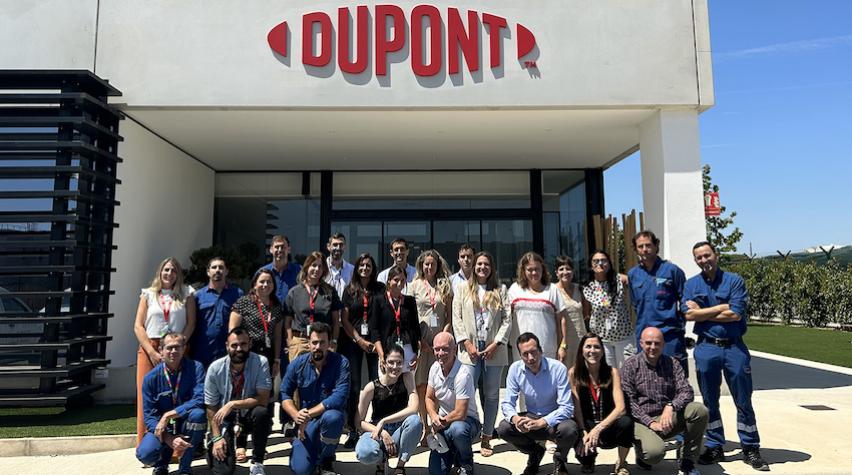
AIChE’s Energy and Sustainability Award is given to individuals or teams from industry who have accomplished significant energy savings, improved the sustainability of chemical processes, or developed innovative technologies for energy generation or delivery. The award is sponsored by Air Products.

The recipient of the 2023 Energy and Sustainability Award is a group: The Prime Reverse Osmosis (RO) Team from DuPont Water Solutions in Edina, Minnesota. The Prime RO Team is being recognized for developing five families of the world’s most energy-efficient reverse osmosis membranes and elements that will reduce global CO2 equivalent emissions by 85,000 tons per year.
A representative from the Prime RO Team will join the other Institute and Board of Directors’ Award honorees at the 2023 AIChE Annual Meeting, November 5–10 in Orlando, Florida.
About the DuPont Water Solutions Prime RO Team
The DuPont Water Solutions Prime RO Team includes more than 30 R&D scientists, application development scientists, marketing managers, and engineers in operations and manufacturing technology across multiple sites of DuPont Water Solutions. Primary R&D and manufacturing sites are located in Edina, Minnesota; Tarragona, Spain; and Jubail, Kingdom of Saudi Arabia.
Water is a critical resource for nearly all industries. With water scarcity and deteriorating water quality a growing global concern, the United Nations Sustainable Development Goals include a target of substantially increasing water-use efficiency across all sectors by 2030.
As described in the Prime RO Team’s award nomination statement, reverse osmosis (RO) is a commonly used technology in industrial water treatment systems. These applications require very pure water to avoid corrosion and downtime. RO, which is a pressure-driven process that separates ions, dissolved salts, and minerals from water using a semi-permeable membrane, is one of the most cost-effective and efficient technologies for this purpose.
With industrial utility water one of the largest end-use segments for the RO membrane market, improvements in RO membrane technology can increase sustainability by lowering the energy required for water filtration. It can also reduce chemical use in downstream processes by achieving higher levels of water purity. Other benefits of improved RO membrane performance include increased efficiency and reduced fuel usage for boilers, reduced downtime, and extending equipment life — all of which can reduce the greenhouse gas emissions of industrial processes.
The team’s RO tech advancements
The DuPont Water Solutions Prime RO Team introduced two improvements to traditional RO membranes. The first innovation was a new, best-in-class brackish water reverse osmosis (BWRO) technology. The DuPont team’s BW30XHR family of products is the most advanced BWRO membranes chemistry on today’s market, providing a balance of energy efficiency, selectivity, and durability, compared to available alternatives. It delivers a 40% reduction in salt passage compared to the incumbent product it replaced, without sacrificing water permeability. This performance improvement was achieved through chemical and physical modifications to the interfacial polymerization.
The second improvement was the upgrade of the base BW30 family of products with an improved membrane chemistry providing a 5% reduction in energy along with a 10% decrease in salt passage. This was achieved by differential reaction conditions that mediate the interfacial polymerization to optimize polyamide stoichiometry and mass distribution.
Overall, the DuPont Water Solutions Prime RO portfolio encompasses multiple generations of membrane innovations that were used to upgrade five families of legacy RO elements. Improvements over the status quo can amount to 20% reduced energy consumption while improving permeate quality by up to 60%.
Analysis using U.S. Environmental Protection Agency (EPA) tools indicates that the sustainability impact of Prime RO membranes has the potential to reduce global CO2 emissions by approximately 85,000 metric tons each year, compared to the legacy products. This is equivalent to the greenhouse gas emissions from some 42,000 metric tons of coal burned, or the carbon sequestered by approximately 1.4 million trees grown for 10 years.
The highly cross-functional and cross-regional Prime RO Team worked closely together for nearly three years to plan, coordinate, develop, and execute this large project.
This fall, ChEnected is presenting profiles of all the 2023 Institute and Board of Directors’ Award recipients. Visit ChEnected regularly to meet the honorees.


